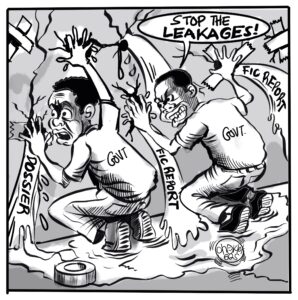Electoral Commission of Zambia (ECZ) Chief Electoral Officer Patrick Nshindano says the commission could not disqualify any party from running in last week’s Kaoma town council by-election despite the deadly violence because it lacked substantiated evidence to rely on.
And Nshindano has reiterated that political parties must desist from ferrying cadres to areas where by-elections are being held, saying that is one of the leading causes o
Last week, PF and UPND cadres clashed in Kaoma, leading to a death of a UPND cadre whom police confirmed was shot by a ruling party supporter.
Commissioner.
But in an interview, Nshindano said the process of disqualifying a political party or candidate was winding and needed explicit evidence before the commission could proceed.
“The conflict started on Sunday the 6th October 2019. Elections were scheduled for the 10th. So this period basically entails that if the resolution was going to be reached at, to cancel or ban the parties involved, elections would have already happened at that particular time. So if we had to go ahead and ban or disqualify the candidate prematurely before that, we would be breaching the constitution. We also need to respect the 90 days within which an election is to be held. If we had to say the elections are cancelled at that particular point, in an instance that the seat falls vacant, you need to ensure that it is filled within 90 days. It means that as the commission, we will be breaching the constitution again,” Nshindano explained.
“If you recall the statement of the police, despite them providing preliminary indication as to what the issue were and who they suspected, they still further went to indicate that they were still investigations that were underway. So that put the commission in a very awkward position. Because the police were still conducting investigations. In as much as we knew that the conflict was between UPND and PF, we did not have the substantiated evidence as per the police investigations which was necessary for us to make the ruling on. That is why the commission remained tied and according to the law, we had to proceed and ensure that the elections proceeded as scheduled on the 10th. Not to say that the commission tolerates election violence. That is something that we are aggrieved of.”
Nshindano outlined the procedure which the commission had to undertake before disqualifying a candidate or party.
“The law is very clear if you look at the Electoral Conduct Act, it provides us with a mandate to be able to disqualify candidates that breach the electoral code of conduct, and rightfully so. Even issues to do with the incident that occurred, despite the law giving us those powers, when you look at the enforcement regulation, under the Statutory Instrument (SI) 62 of 2016 in the Electoral Process Act, under the electoral code of conduct enforcement regulation, you find that there are have some certain processes that need to be followed before a political party can be disqualified. There has to be an official complaint from the public or political party to start the process of hearing in terms of conflict resolutions. In the absence of that, the commission can also do that where we see a breach, we can facilitate for that process to start off, but it has to start according to the SI,” Nshindano said.
“This issue had to be referred to the District Conflict Management Committee which has to hear the issue within 24 hours this is upon receipt of that complaint. Within 24 hours, they should make that ruling. When they hear, they summon the aggrieved party or those that have been affected to come and make a presentation and then make a determination within 24 hours. But it does not end there, that determination has to be referred to the National Conflict Committee where they make the recommendation. The law is not clear as to when they need start hearing. But it does provide that the committee needs to hear the matter within 48 hours. And review that recommendation coming from the district. After that is done, then the NCC makes its recommendation and passes it on to the electoral commission. And upon receipt of that recommendation, the electoral commission has to hear that recommendation within 72 hours. But in so doing, we need to uphold an opportunity to the party to be heard.”
And Nshindano insisted that ferrying of cadres from Lusaka was one of the leading causes of violence.
“It is important to say that the electoral commission does have regular meetings with all political parties and one of the things we emphasize to political parties is; the issue of electoral violence, including the issue of ferrying cadres to areas where elections are happening. If you look at most of these conflicts, it is caused by outsiders, people that are out the jurisdiction. There is even an unfortunate situation that we have now, the death. That person is not from Kaoma. Our appeal to political leaders has always been to maintain the peaceful electoral process. We cannot do it alone as the commission, it requires concerted efforts from these political leaders,” said Nshindano.
























